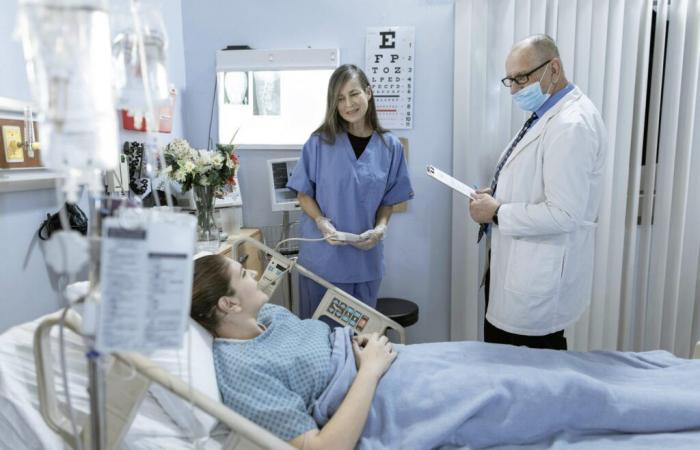
“The deployment of the patient experience will be promoted with the installation of expert patients”. Dominique Peljak, the general director of the CHR Metz-Thionville announced this during the greeting ceremony organized in Metz on January 10, during which he discussed the projects and ambitions of the various CHR establishments. The “concept” of patient experience is not new but it is clear that it is gaining momentum.
What are we talking about? There are various definitions of patient experience, but let’s put it simply: it is all the interactions of patients and their loved ones with a healthcare organization, likely to influence their perception throughout their healthcare journey. These interactions are shaped both by the organization of this journey but also by the life history of the person concerned. », to take up that of the Beryl Institute, an American organization strongly mobilized on this subject for more than 15 years. “Patient experts” also called “patient partners” are people who are suffering (or have been) from a (chronic) illness and are keen to share this experience/expertise with patients and caregivers… Training are provided by patient associations or universities (some issue diplomas) and are offered for those who wish to embark on this path in the service, ultimately, of the general interest. And this in order to acquire knowledge and skills but also the necessary “legitimacy”. Such training is activated at the University of Lorraine, for example.
Helping the sick but also caregivers
If, like many hospitals (including in Lorraine, like the Uneos Group, for example), the CHR of Metz-Thionville intends to strengthen its involvement in this register, it is because this generates shared value and beneficial in many ways. Let us clarify from the outset, even if it is obvious, that the patient partner is not intended to replace doctors or nurses. He doesn’t deal with illness either. Its mission is to support and share its experience with patients and their loved ones in order to help them better “manage” their illness (medically and beyond). We then also speak of “peer helper”. He can, for example, be involved in what is called therapeutic patient education (TPE) which aims to help a person suffering from a chronic illness to acquire new skills to better treat themselves and, more generally, even better. live every day. It is also required to intervene in areas such as training/awareness of health students, research with a view to promoting innovations in care or even in “quality” reflections undertaken by establishments to improve their functioning and their practices for the benefit of patient satisfaction.
Measuring the latter is also imperative to progress and challenge yourself. Each year, the Haute Autorité de Santé unveils, for large healthcare establishments, their certification results and their health care quality and safety indicators. So much information to which the public has access via the Qualiscope service in order to “to help users better navigate the health system”indicates the HAS. And given the eagerness with which hospitals are keen to share their results (at least the good ones), there is no doubt that these “patient reviews” which focus on well-being, the quality of meals, comfort, relations with staff […]are of great importance.
From paternalism to 4P medicine
The patient-expert is gradually finding his place in the hospital while establishments must turn their backs on a curative and “paternalistic” approach – which also implies that health actors evolve in the relationship with their patients – to drive medicine of the 4Ps. Tomorrow it will be participatory, personalized (precision medicine), preventive and predictive in order to better respond to health, economic or societal challenges and issues (demography is one). These developments are driven by multiple scientific, technical or technological innovations. The growing place of artificial intelligence (AI) in medical practice is an illustration of this: assisted surgery, imaging, intelligent prostheses, risk apprehension, etc.
“AI allows healthcare providers to spend time with their patients that they do not spend on administrative tasks”
OECD
In another register, it will also free up time for caregivers. “AI supports healthcare providers in the exercise of their profession and allows them to spend with their patients the time that they do not spend writing down notes or taking care of administrative tasks. Up to 36% of health and social service activity could be automated through its use”specifies the OECD (Organization for Economic Cooperation and Development) in a report published last year devoted to the contribution of AI to the field of health. “It is able to increase the quality of work, that of human interactions and that of the results obtained”it is also specified.
-With even greater efficiency if “the patient” is able to fully assume his role as an actor in his care pathway (helped in this by access to information, digital tools or even a necessary reciprocal patient-caregiver “trust” within the hospital and outside its walls given the rise in ambulatory surgery (without accommodation) supported, here again, by developments in techniques, practices and technologies as well than economic considerations.
“The development alongside precision medicine of participatory medicine contributes to the development of medicine providing the best medical treatments and the best human care.”
National Academy of Medicine
In outpatient services, the concept of “moving forward” (via an entire pathway and personalized support) is gaining ground. “The development alongside precision medicine (for patients) of participatory medicine (with patients) contributes to the development of medicine providing at the same time the best medical treatments and the best human care”writes the National Academy of Medicine in a report adopted last March dedicated to “patient partners”.
“Care for those who care”
Since 2018, the French Institute of Patient Experience (IFEP) has published each year a patient experience barometer aimed at taking stock of the evolution of the customer experience in healthcare establishments (the results of the 6e barometer will be announced at the end of January). In the 2023 edition, we learn that 60% of healthcare establishments in France have adopted concrete steps to improve the patient experience, in particular through staff training and optimization of communication between caregivers and patients. 63% of professionals also believe that improving the patient experience has a direct impact on the quality of care.
The barometer also poses pitfalls to its deployment. The main obstacle identified (64%) by healthcare professionals is staff burnout, which has increased since 2019. “Work overload, lack of resources and stress prevent caregivers from devoting themselves fully to improving of the patient experience”. Hence the importance “to take care of those who care” to use the words of Dominique Peljak during his wishes, by deploying services and resources, also by rethinking management. Good news, as it is compatible with the need to recruit and retain staff, all hospital establishments are strongly mobilized in this area.





